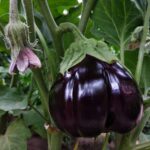Eggplant, also known as aubergine, is a popular vegetable in many cuisines due to its versatile flavor and texture. Whether roasted, grilled, or fried, eggplant adds depth and richness to many dishes. However, growing eggplant can be a challenging task for even seasoned gardeners. In this article, we will provide guidance on how to grow healthy and productive eggplants in your own backyard.
To start with, selecting the right variety of eggplant is crucial for success. Eggplants come in various sizes and shapes, including round or elongated fruits that are white or purple. Some common varieties include Black Beauty, Italian Long Purple, and Fairy Tale. Each variety has unique characteristics that affect their growth patterns such as resistance to diseases and pests. Furthermore, understanding how to prepare the soil properly before planting is critical in ensuring optimal growth conditions for your eggplants. By following these steps along with other important considerations such as watering and fertilizing techniques, you can enjoy a bountiful harvest of delicious eggplants from your own garden.
Selecting The Right Variety Of Eggplant
Eggplants, with their glossy purple skin and unique texture, are a popular vegetable in many cultures around the world. Selecting the right variety of eggplant is crucial for ensuring a successful harvest. With so many different varieties available, it can be overwhelming to decide which one to choose. Varieties comparison and understanding growing conditions are key factors to consider when selecting the right variety of eggplant.
There are numerous varieties of eggplant to choose from, each with its own unique characteristics. Some popular varieties include Black Beauty, Long Purple, Japanese Traviata, and Rosa Bianca. It’s important to compare different varieties based on their size, shape, color, flavor profile, and disease resistance. By doing so, you can select the best variety that suits your needs and preferences.
Aside from comparing different eggplant varieties, it’s essential to understand their growing conditions. Eggplants thrive in warm weather with plenty of sunlight and well-draining soil. They require regular watering but are sensitive to overwatering or waterlogged soil. Understanding the growing conditions specific to each variety will help ensure that they grow optimally and produce healthy fruits. In the subsequent section about understanding the growth patterns of different varieties, we will delve deeper into this topic.
Understanding The Growth Patterns Of Different Varieties
Different varieties of eggplants have unique growth patterns that require specific care to achieve optimal yields. Understanding the characteristics of each variety is essential before planting them. For instance, some eggplant varieties are compact and bushy, while others grow tall and slender. Compact varieties require less space and support than tall ones that may need stakes or cages to prevent them from falling over due to their heavy fruits.
Besides the physical appearance, growth requirements like soil type, temperature range, water needs, and fertilization methods vary among different varieties of eggplants. For example, some eggplant varieties prefer well-drained sandy loam soils that are rich in organic matter but not too acidic or alkaline. Others thrive in heavy clay soils with high nutrient content. Similarly, temperature range affects the growth rate of eggplants; some varieties tolerate cold weather better than others.
Variety characteristics and growth requirements play a crucial role in determining the success of growing eggplants. Therefore, selecting the right variety for your location and ensuring proper soil preparation is vital for optimal growth. In the subsequent section, we will discuss how to prepare your soil for planting your selected variety of eggplant to ensure maximum yield potential.
Preparing The Soil For Optimal Growth
Understanding the growth patterns of different eggplant varieties is crucial in planning for a successful harvest. However, it is equally important to ensure that the soil is prepared properly to support optimal growth. Soil preparation involves several critical steps such as clearing debris and weeds, tilling the soil, and adding fertilizers.
Proper nutrient management is essential for growing healthy eggplants. Before planting, it is necessary to test the soil ph and nutrient levels to determine which nutrients are lacking. Once this is established, you can add organic matter such as compost or manure to improve soil fertility. A well-fertilized garden bed promotes plant growth and increases resistance to pests and diseases.
Testing soil ph and nutrient levels can be easily done using a simple testing kit available at most garden supply stores. It is recommended to test the soil at least once a year to monitor any changes in nutrient levels over time. Additionally, periodic addition of organic matter helps maintain long-term soil health by improving its structure and moisture retention capacity.
Preparing the soil for optimal growth through nutrient management creates an environment where eggplants can thrive. By providing adequate nutrition along with proper care, your eggplant plants are more likely to produce an abundant yield of healthy fruits. In the next section, we will discuss how to prepare the ideal growing conditions for your eggplants by discussing watering techniques, pest control measures, and other important considerations that will ultimately lead you towards having a bountiful harvest.
Testing Soil Ph And Nutrient Levels
Soil testing is an essential part of growing healthy eggplants. Testing your soil pH and nutrient levels will help you identify any potential issues that could hinder plant growth. Before planting, take a sample of your soil and have it tested by a local lab or university extension service.
Once you receive the results, look for any signs of nutrient deficiencies such as nitrogen, phosphorus, or potassium. These nutrients are crucial for eggplant growth and development. If your soil is lacking in one or more of these nutrients, consider adding fertilizer to the soil before planting.
Identifying nutrient deficiencies early on can help prevent stunted growth and poor yields. By testing your soil regularly and addressing any issues promptly, you can ensure that your eggplants grow strong and healthy. In the next section, we will cover how adding organic matter can improve soil quality and provide the nutrients necessary for successful eggplant cultivation.
Adding Organic Matter To Improve Soil Quality
Organic matter is important for soil quality and contributes to the fertility, structure and water retention of the soil. Organic matter can be added to soil in the form of compost, manure and green manure. Adding organic matter can improve soil structure, increase water retention, provide nutrients, and reduce soil compaction. With improved soil quality, plants such as eggplants can thrive in the garden.
Types Of Organic Matter
When it comes to growing healthy and abundant eggplants, the quality of the soil is crucial. One way to improve soil quality is by adding organic matter, which can provide essential nutrients for plants while also improving soil structure and water retention. There are many types of organic matter that can be used for this purpose, each with its own set of benefits.
Composting is one of the most popular options for adding organic matter to soil. This process involves collecting food scraps, yard waste, and other biodegradable materials in a compost bin or pile and allowing them to decompose over time. Composting benefits include reducing waste sent to landfills, creating rich nutrient-dense soil amendment, and promoting healthy soil microbial activity. It’s important to note that it can take several months or even a year for composting materials to fully break down and become usable in the garden.
Other soil amendment options include cover crops, animal manure, and leaf mold. Cover crops are planted in between growing seasons to add nutrients back into the soil as they grow and then get tilled under before planting again. Animal manure can provide high levels of nitrogen but must be aged properly before use to avoid burning plants with excess ammonia levels. Leaf mold is made by collecting leaves in a pile or bin until they break down into a crumbly texture that can be added directly to the garden bed.
In conclusion, adding organic matter is an effective way to improve soil quality when growing eggplants. Composting is an excellent method due to its numerous benefits such as reducing waste sent to landfills and creating nutrient-rich soil amendments, but there are also other viable options such as cover crops, animal manure, and leaf mold depending on personal preferences and availability. Regardless of which type of organic matter is chosen, regularly incorporating it into garden beds will lead to healthier plants with higher yields.
Benefits Of Organic Matter
Adding organic matter to soil is a crucial step in maintaining healthy and productive plants, such as eggplants. Organic matter can improve soil structure, water retention, and provide essential nutrients for plant growth. Among the different organic matter options available, composting stands out due to its numerous benefits. Composting involves collecting biodegradable materials such as food scraps and yard waste in a bin or pile and allowing them to decompose over time. The resulting nutrient-rich compost can then be used to enhance soil quality.
The importance of composting cannot be overstated. Aside from providing an excellent source of organic matter for soil improvement, composting also helps reduce waste sent to landfills by diverting biodegradable materials from the trash stream. Furthermore, composting promotes healthy soil microbial activity that further enhances plant growth and health. However, it is important to note that composting requires patience since it may take several months or even a year before the materials fully break down into usable compost.
One of the most significant benefits of adding organic matter to soil is improving overall soil health. Healthy soils have better water retention capacity, are more resistant to erosion, and support more robust root development that leads to healthier plants with higher yields. Additionally, adding organic matter can help mitigate some of the negative effects of conventional farming practices such as reduced biodiversity and increased use of synthetic fertilizers and pesticides. By incorporating organic matter through methods like composting, gardeners can help create a more sustainable agricultural system while also enjoying the many benefits that come with healthier plants and soils.
Choosing The Best Planting Location
Adding organic matter to the soil is essential for growing healthy eggplants. It aids in improving soil quality by providing necessary nutrients and increasing water retention capacity. Once you have improved the soil quality, it’s time to choose an ideal location for planting.
Eggplants thrive in warm climates with plenty of sunlight, so choosing a sunny location is crucial. They also require ample space to grow and should be planted in areas that receive at least six to eight hours of sunlight daily. The best time to plant eggplants is during the early summer months when temperatures are consistently above 60°F.
Despite their hardiness, eggplants can face potential obstacles such as pests and diseases. To avoid these issues, select a planting site that has good air circulation and adequate drainage. In addition, make sure to rotate crops every year to prevent disease buildup in the soil. Maintaining proper moisture levels is also important as both overwatering and underwatering can lead to stunted growth or fruit rotting.
Providing adequate sunlight and water is crucial for growing healthy eggplants. In the next section, we will discuss how to properly water and provide sufficient sunlight for your plants throughout their growth cycle. By following these steps, you can ensure that your eggplants grow optimally and yield a bountiful harvest.
Providing Adequate Sunlight And Water
Adequate sunlight and water are essential for growing healthy eggplants. Sunlight duration is a critical factor that affects the growth and yield of eggplants. These plants require at least six hours of direct sunlight daily to thrive. Eggplants need full sun exposure to produce the best quality fruit, so it’s crucial to position them in an area with maximum sunlight exposure.
Watering frequency is another important factor that can make or break your eggplant crop. It’s crucial to keep the soil consistently moist but not waterlogged. Overwatering can lead to root rot, which can cause stunted growth or even death. Therefore, it’s essential to avoid overwatering by watering the plants when the top inch of soil feels dry to touch. Providing shade during hot weather will help prevent moisture loss through evaporation.
To grow healthy eggplants, it’s vital to provide adequate sunlight and water while avoiding overwatering and providing shade when necessary. The ideal time to water eggplants is early morning or late afternoon when temperatures are cooler, allowing the plants enough time to absorb moisture before evaporating. Additionally, providing shade during hot weather will help prevent moisture loss through evaporation and protect your plants from heat stress.
In summary, maintaining proper sunlight duration and watering frequency is crucial for growing healthy eggplants. However, this isn’t enough for optimal growth; fertilizing techniques must also be employed for a bountiful harvest.
Fertilizing Techniques For Healthy Growth
- Organic fertilizers are an effective way to provide essential nutrients to soil and promote healthy growth in eggplant plants.
- A balanced blend of nutrients is necessary for proper nutrition, with nitrogen, phosphorous, and potassium as the primary components for eggplant growth.
- Watering frequency should be adjusted depending on the environment, with more frequent watering needed in warmer climates and less frequent watering in cooler climates.
- Organic fertilizers can provide a slow and steady release of nutrients to the soil, helping to promote long-term growth and health of eggplant plants.
- The soil must be tested regularly to ensure the proper balance of nutrients is maintained to provide optimal growth conditions for eggplant plants.
- Proper watering techniques help to ensure consistent moisture levels in the soil, and should be adjusted according to the season.
Organic Fertilizers
The use of organic fertilizers for eggplant cultivation can have numerous benefits. Organic fertilizers are made from natural sources that provide essential nutrients to the plants without causing harm to the environment or human health. These fertilizers also help in improving soil structure and water retention capacity, thereby enhancing overall plant growth and productivity.
However, there are certain drawbacks to using organic fertilizers as well. One of the main challenges is that they release nutrients slowly, which may not meet the immediate nutrient requirements of the plants. Additionally, they may contain lower concentrations of certain nutrients compared to synthetic fertilizers. Moreover, organic fertilizers require proper storage and handling as they can attract pests and pathogens if not properly managed.
When it comes to choosing between homemade and store-bought organic fertilizers, both options have their own advantages and disadvantages. Homemade organic fertilizers are cost-effective and can be easily prepared using kitchen scraps, animal manure or compost. However, they may not offer a balanced mix of essential nutrients required for optimal plant growth. Store-bought organic fertilizers are more reliable in terms of nutrient content but can be expensive compared to homemade options.
In conclusion, using organic fertilizers is an effective way to cultivate healthy eggplants while minimizing negative impacts on the environment and human health. Both homemade and store-bought options have their own merits depending on individual needs and preferences. It is important to carefully assess the nutrient requirements of eggplants before selecting a fertilizer type to ensure optimal growth and productivity.
Balanced Nutrients
In addition to choosing between homemade and store-bought organic fertilizers, it is also crucial to consider the nutrient balance of the fertilizer being used. Eggplants require a balanced mix of essential nutrients for optimal growth and productivity. Nitrogen, phosphorus, and potassium are the three primary macronutrients required in higher concentrations by eggplants. However, they also need micronutrients such as calcium, magnesium, sulfur, iron, zinc, copper, and manganese in smaller amounts.
To ensure that eggplants receive a balanced mix of nutrients, companion planting and crop rotation can be implemented alongside fertilizing techniques. Companion planting involves growing two or more plant species together that have mutually beneficial relationships. For example, growing legumes such as beans or peas with eggplants can increase nitrogen levels in the soil naturally. On the other hand, crop rotation involves alternating the location of crops each season to prevent soil depletion and build-up of pests and diseases.
In conclusion, achieving a balanced nutrient mix is an important aspect of fertilizing techniques for healthy eggplant growth. The use of companion planting and crop rotation can be beneficial in ensuring that all essential nutrients are provided while minimizing negative impacts on the environment and human health. It is recommended to conduct soil tests periodically to determine any nutrient deficiencies or imbalances before selecting a fertilizer type or implementing any fertilizing technique.
Watering Frequency
Another crucial aspect of fertilizing techniques for healthy eggplant growth is watering frequency. Eggplants require sufficient moisture to grow and produce fruits successfully. However, overwatering can lead to root rot or other fungal diseases, which can damage the plant’s health and productivity.
Watering tips for eggplants include watering deeply but infrequently to encourage deeper root growth. It is recommended to water once or twice a week, depending on the climate and soil type. In areas with high humidity or heavy clay soil, it may be necessary to water less frequently to prevent waterlogging. Additionally, it is essential to avoid overhead irrigation, as wetting the leaves can increase the risk of fungal diseases.
To determine when to water eggplants, it is best to check the soil moisture level regularly by inserting a finger or moisture meter into the soil. If the top inch of soil feels dry or slightly moist, it is time to water. It is also important to note that young seedlings may require more frequent watering until they establish their roots fully.
In summary, proper watering techniques are just as important as selecting appropriate fertilizers for healthy eggplant growth. By following these watering tips and avoiding overwatering, gardeners can ensure that their eggplants receive adequate moisture without compromising their health and productivity.
Mulching To Conserve Moisture And Suppress Weeds
Mulching is a widely-used technique in agriculture and horticulture, where a layer of material is spread on top of the soil surface to conserve moisture and suppress weed growth. The benefits of mulching have been extensively studied, and it has been found to be one of the most effective ways to maintain soil moisture levels, reduce erosion, improve soil structure, and enhance nutrient availability. Additionally, mulch can act as an insulator, protecting plants from extreme temperatures.
There are several types of mulch materials available that are suitable for eggplant cultivation. Organic materials such as straw, leaves, grass clippings, and wood chips are commonly used as they break down over time and add organic matter to the soil. Inorganic materials such as plastic sheets or gravel can also be used but are less effective at improving soil health.
Mulching is particularly beneficial for eggplant growers because it helps maintain consistent moisture levels in the soil which is essential for optimal growth. The layer of mulch acts as a barrier between the sun’s rays and the soil surface reducing evaporation rates. Moreover, by suppressing weed growth around the eggplant plants using mulch, nutrients become more readily available to them allowing for better yields. As we move forward into our next section about pruning for increased yield and better airflow let us take note that this technique should be done with care so as not to damage any fruiting branches that may later yield bountiful harvests.
Pruning For Increased Yield And Better Airflow
Pruning is an important horticultural practice to optimize yield and airflow, which is especially true for eggplant. To achieve this, growers should focus on the eggplant’s growth habit, stem reduction and leaf pruning to create an open centre, as well as selecting vigorous plants and increasing light within the canopy. Other important considerations to achieve increased yield and better airflow include disease prevention, fruit quality, fertilization, watering schedule, mulching, and soil quality.
Pruning
Pruning eggplants is an essential technique that can greatly enhance the yield and quality of the fruits. By removing unwanted shoots, leaves, and stems, you can direct the plant’s energy towards producing larger and healthier eggplants. The benefits of pruning include increased airflow, improved light penetration, better disease control, and more efficient use of nutrients.
When to prune eggplants depends on the variety and growing conditions. Generally, it is recommended to start pruning when the plants reach a height of 12-18 inches or have developed 5-7 leaves. This will ensure that you remove any weak or damaged growth while allowing the plant to establish a strong root system. You should also continue to prune throughout the growing season as needed, especially if you notice any signs of disease or insect infestation.
To properly prune your eggplants, use a sharp pair of scissors or pruning shears and make clean cuts at a 45-degree angle. Start by removing any suckers that grow between the main stem and branches, as these will only sap energy from the plant. Next, remove any yellowing or wilted leaves as they can harbor pests and diseases. Finally, thin out any overcrowded areas by cutting back stems that are crossing over each other or growing too close together. With careful pruning practices in place, you’ll enjoy healthy and bountiful eggplant harvests all season long!
Yield
Pruning is an essential technique for maximizing yield and preserving eggplant freshness. By removing unwanted growth, eggplants can direct their energy towards producing bigger and healthier fruits. Pruning also promotes better airflow, which reduces the risk of disease and insect infestations, resulting in a more bountiful harvest.
To achieve maximum yield, it is recommended to start pruning when the plants are around 12-18 inches tall or have developed 5-7 leaves. This will allow for the removal of any weak or damaged growth while enabling the plant to establish a strong root system. Pruning should continue throughout the growing season as needed, especially if there are any signs of disease or pest infestation.
Proper pruning practices involve using sharp scissors or pruning shears and making clean cuts at a 45-degree angle. It starts by removing suckers that grow between branches and the main stem, as these only sap energy from the plant. Then remove any yellowing or wilted leaves to prevent pests and diseases from taking hold. Finally, thin out overcrowded areas by cutting back stems that are crossing over each other or growing too close together. In incorporating these practices into your gardening routine, you will enjoy healthy and bountiful eggplant harvests all season long!
Pest And Disease Prevention Strategies
After pruning your eggplant, the next important step is to prevent pests and diseases that can harm your plants. Companion planting is a great way to naturally deter pests and attract beneficial insects. Planting herbs such as basil, thyme, and rosemary near your eggplant can repel insects while also enhancing flavor in the fruit. Marigolds are another popular companion plant for eggplant as they repel nematodes and other soil-borne pests.
In addition to companion planting, there are several natural remedies you can use to prevent common eggplant pests and diseases. For example, spraying a mixture of water and neem oil can deter aphids, spider mites, and whiteflies. Bt (Bacillus thuringiensis) is a naturally occurring bacteria that can be applied to control caterpillars on your eggplants. Lastly, using a mulch made from leaves or straw around the base of your plants can help retain moisture in the soil while also suppressing weeds.
By incorporating these pest and disease prevention strategies into your eggplant growing routine, you’ll be able to produce healthy plants with high yields of delicious fruit. However, even with these precautions in place, it’s important to stay vigilant for any signs of common eggplant problems such as blossom end rot or fungal infections. In the next section, we’ll cover some of the most frequent issues encountered when growing eggplants along with solutions for addressing them effectively.
Common Eggplant Problems And Solutions
An interesting statistic about eggplants is that they are one of the most commonly grown vegetables in the world. However, even the most experienced gardeners can encounter problems when growing eggplants. Some of the most common issues include pests and diseases.
One way to combat these problems is by planting companion plants alongside your eggplants. Companion planting involves growing different plants together that have a mutually beneficial relationship. For example, planting basil near your eggplants can help repel pests like aphids and spider mites. Additionally, marigolds are another great option as they contain natural compounds that repel harmful nematodes.
Another effective method for combating common eggplant problems is to use natural pest control methods. One such method is using insecticidal soap which can be sprayed directly onto the leaves of the plant to kill off any unwanted pests without harming beneficial insects or other wildlife. Additionally, neem oil is another popular choice as it contains natural compounds that disrupt pest feeding habits and growth cycles.
As you can see, there are several ways to address common issues faced when growing eggplants. By utilizing companion planting techniques and natural pest control methods, you can ensure a healthy harvest of delicious eggplants. In the subsequent section, we will discuss how to properly harvest and store your eggplants for optimal freshness and flavor.
Harvesting And Storing Eggplants
When it comes to harvesting eggplants, timing is everything. The fruit should be picked when it reaches its mature size but is still shiny and firm. Waiting too long can result in overripe, tough fruit that is not suitable for consumption. To harvest the eggplant, use a sharp knife or pruning shears to cut the stem about an inch above the fruit. Be sure to handle the eggplant with care as they have delicate skin that bruises easily.
To preserve eggplants, there are various methods available such as freezing, pickling, canning, and drying. Freezing is one of the most popular ways to store eggplants as it retains their flavor and texture. Before freezing, blanch the eggplant by boiling them for 3-4 minutes then submerging them into ice water for another 3-4 minutes. Once cooled, pat dry with paper towels and place them into freezer bags or containers. Pickling and canning are also excellent options for preserving eggplants while drying requires careful attention to moisture levels.
Eggplants are a versatile ingredient in cooking that can be used in a variety of recipes ranging from traditional Mediterranean dishes like Moussaka to contemporary fusion cuisine like Eggplant Parmesan Pizza. There are countless creative ways to use eggplants in cooking beyond these classic dishes including stir-fried eggplant with garlic and ginger or grilled eggplant salad with feta cheese and fresh herbs. Whether you decide to preserve your freshly harvested eggplants or cook them up right away, there’s no doubt that this nutritious vegetable will satisfy your cravings with its unique taste and texture.
Creative Ways To Use Eggplants In Cooking
Eggplants can be cooked in a variety of creative ways, including grilled dishes, curries, ratatouille, lasagnas, parmesans, roasts, pizzas, burgers, baba ganoush, dips, fries, soups, stews, and salads. Growing eggplants can be done in a variety of ways, including planting seeds directly into the ground, transplanting seedlings into the ground, or growing them in containers with well-draining soil. Eggplants require full sun and warm temperatures, and should be watered regularly to ensure adequate growth and development. To ensure successful eggplant harvests, it is important to select varieties that are well-suited for the climate and soil conditions of the desired growing area.
Grilled Eggplant Dishes
As a horticulturalist, I have come to appreciate the versatility of eggplants. One creative way to use eggplants in cooking is by grilling them. Grilled eggplant dishes can be a great addition to any meal, whether it’s a backyard barbecue or a fancy dinner party.
Grilled eggplant appetizers are perfect for any occasion. One easy recipe is to slice the eggplant into rounds and brush them with olive oil. Place them on the grill and cook until they are tender and slightly charred. Top with your favorite toppings, such as feta cheese, cherry tomatoes, and basil, for a delicious appetizer that will impress your guests.
Eggplant based grilling sauces are another great way to incorporate this vegetable into your meals. A simple recipe is to blend grilled eggplant with garlic, lemon juice, tahini, and olive oil for a flavorful dip or sauce that can be used on grilled meats or vegetables. The possibilities are endless when it comes to using eggplants in grilling recipes, so don’t be afraid to experiment and get creative in the kitchen!
Eggplant Curry Recipes
As a horticulturalist, exploring creative ways to use eggplants in cooking has been an exciting journey. Eggplants are a versatile vegetable that is packed with nutrition, making it an excellent addition to any meal. One recipe that stands out when it comes to eggplant dishes is the Eggplant Curry Recipe.
Eggplant Curry Recipes are vegan eggplant dishes that can be created using various ingredients and spices. The recipe involves sautéing eggplants in oil and then adding a blend of spices such as cumin, coriander, turmeric, and chili powder. Tomatoes, onions, and garlic are added for extra flavor before simmering the mixture until the eggplants are tender. This dish can be served with rice or bread for a satisfying meal.
The health benefits of Eggplant Curry Recipes cannot be overlooked. Eggplants are low in calories but high in fiber, vitamins B6 and K, and potassium. The combination of these nutrients makes this dish not only delicious but also beneficial for overall health. By incorporating Eggplant Curry Recipes into your diet, you can enjoy a tasty and healthy meal while satisfying your craving for something new and adventurous in the kitchen.
Troubleshooting Common Garden Issues
One of the most common issues that gardeners face when growing eggplants is dealing with pests. There are several types of insects that can damage eggplant plants, including flea beetles, aphids, and spider mites. Flea beetles are small black or brown beetles that chew small holes in the leaves of eggplant plants, while aphids and spider mites suck sap from the plant’s leaves and stems.
To prevent pest infestations on your eggplant plants, it is important to keep the garden area clean and free of debris. Remove any weeds or dead plant material from around the base of the plants, as these can provide a hiding place for pests. Additionally, you can use organic insecticides such as neem oil or insecticidal soap to control pest populations.
Another common issue that gardeners face when growing eggplants is preventing fungal diseases. Fungi thrive in warm and humid conditions and can cause problems such as leaf spot, powdery mildew, and anthracnose on your eggplant plants. To prevent fungal infections, ensure that your plants have adequate airflow by spacing them out properly and pruning any overgrown branches or leaves. Additionally, avoid watering your plants from overhead as this can promote fungal growth on the leaves.
In summary, dealing with pests and preventing fungal diseases are two common issues that gardeners face when growing eggplants. By keeping your garden area clean and using organic insecticides to control pests, you can help prevent infestations on your eggplant plants. Similarly, ensuring proper airflow around your plants by spacing them out adequately and avoiding overhead watering can help prevent fungal infections on your eggplants.
Frequently Asked Questions
How Do I Know When My Eggplants Are Ripe And Ready To Harvest?
As a horticulturalist, I cannot stress enough the importance of knowing when to harvest eggplants. Not only does it ensure peak flavor and quality, but it also prevents any potential health risks from consuming unripe fruit. So, how do you know when your eggplants are ready for picking? Look for these ripeness indicators: a glossy and firm skin, a dull sound when tapped, and a slight give when gently pressed. Once harvested, preserve your eggplants by storing them in a cool and dry place or freezing them for long-term use. And speaking of use, there are endless recipes for ripe eggplants – from classic dishes like Eggplant Parmesan to more creative options like Grilled Eggplant with Chimichurri Sauce. Don’t let your hard work in growing eggplants go to waste – harvest them at the right time and enjoy the delicious rewards!
Can I Grow Eggplants In Containers Or Do They Need To Be Planted In The Ground?
Eggplants can be grown in containers, although they require a larger container size than some other vegetables due to their deep root system. When growing eggplants in containers, it is important to choose a well-draining potting mix that is rich in nutrients. Soil preparation for eggplants in containers involves adding organic matter such as compost or aged manure to the potting mix before planting. Additionally, regular fertilization and watering are necessary for optimal growth and fruit production. Container gardening is a viable option for those with limited space or poor soil conditions, but careful attention must be paid to soil quality and nutrient management to ensure successful eggplant cultivation.
How Often Should I Water My Eggplants And How Much Water Do They Need?
In order to maintain healthy eggplants, it is important to pay attention to watering frequency and soil moisture. Eggplants require consistent moisture, but overwatering can lead to root rot and other diseases. The frequency of watering will depend on the climate and temperature of the region as well as the type of soil being used. It is recommended to water deeply once a week or when the top inch of soil feels dry to the touch. This will encourage deep root growth and prevent waterlogged soil conditions. Additionally, it is important to ensure proper drainage in containers or garden beds. Regular monitoring of soil moisture levels through touch or using a moisture meter can help prevent under or overwatering. By following these guidelines, individuals can successfully grow healthy and fruitful eggplants that can be enjoyed at home or shared with others.
What Is The Best Time Of Year To Plant Eggplants?
Planting strategies for eggplants depend greatly on climate considerations. The best time of year to plant eggplants is during the warm season when the soil temperature has reached at least 60°F. In areas with colder climates, it is recommended to start seeds indoors and transplant them outside once the danger of frost has passed. It is also important to select a sunny location with well-draining soil and provide adequate water and nutrients throughout the growing season. Overall, successful eggplant cultivation requires careful planning and attention to environmental factors that can affect plant growth and development.
Are There Any Companion Plants That I Should Avoid Planting Near My Eggplants?
When it comes to companion planting for eggplants, there are both beneficial and harmful plants to consider. Beneficial companions include herbs such as basil, marigold, and tarragon, which can help deter pests and diseases. However, there are also plants that should be avoided when planting near eggplants, such as fennel and other members of the Apiaceae family, as they can attract pests like aphids and spider mites. Managing pests and diseases is crucial for successful eggplant growth, so it’s important to choose companion plants wisely. In addition to selecting appropriate companions, practicing good garden hygiene by removing diseased plant material and rotating crops can help prevent problems with pests and diseases.
Conclusion
Eggplants are a versatile and nutritious addition to any garden. To ensure a successful harvest, it is important to understand when they are ripe and ready for picking. Look for firm and shiny fruits that have a deep purple color. Avoid overripe eggplants as they tend to have a bitter taste.
Eggplants can be grown in containers or planted in the ground, but it is important to ensure that they have enough space to grow. Watering should be done regularly, especially during hot and dry weather, with an average of 1-2 inches of water per week. The best time of year to plant eggplants is during the warm summer months, preferably when the soil temperature reaches at least 70°F.
When planting eggplants, avoid placing them near plants from the nightshade family such as tomatoes and peppers. These plants share common pests and diseases which can affect their growth and development. In conclusion, growing eggplants can be a rewarding experience if done correctly. Follow these guidelines for a bountiful harvest of delicious and healthy fruits all summer long.
Image Credits
- “Eggplant” by NellieMcS (featured)





























